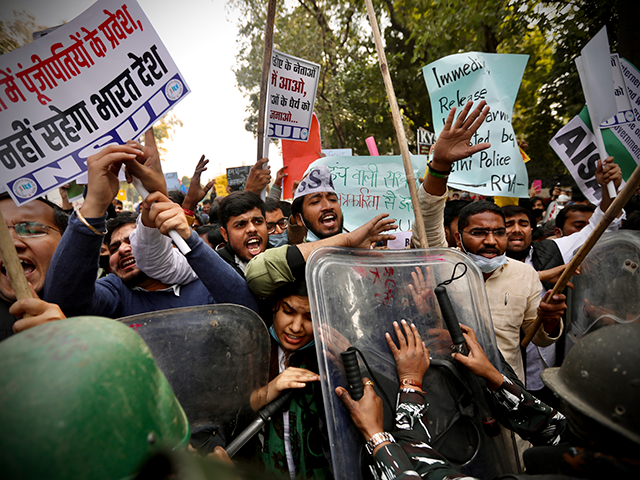India’s foreign ministry on Wednesday denounced “vested interest groups” for attempting to impose their agenda on farmers’ protests in New Delhi after Western celebrities commented on the demonstrations via social media this week.
“It is unfortunate to see vested interest groups trying to enforce their agenda on these protests, and derail them,” India’s Ministry of External Affairs (MEA) said in a statement released February 3.
“Before rushing to comment on such matters, we would urge that facts be ascertained, and a proper understanding of the issues at hand be undertaken. The temptation of sensationalist social media hashtags and comments, especially when resorted to by celebrities and others, is neither accurate nor responsible,” the Indian foreign ministry added.
“Among those who had expressed solidarity with the farmers on Twitter were pop star Rihanna, environmental activist Greta Thunberg and also U.S. Vice-President Kamala Harris’ lawyer niece Meena Harris,” the Times of India reported on Wednesday.
Tens of thousands of farmers have been camped out on the outskirts of India’s national capital, New Delhi, since November to protest three agricultural reforms passed by the Indian Congress in September. The farmers, mainly from the Sikh-dominated state of Punjab, say the reforms undermine their traditional farm price and labor protections.
“The farmers, who form a powerful political constituency, fear the laws passed in September could pave the way for the government to stop buying grains at guaranteed prices, leaving them at the mercy of private buyers,” India’s NDTV news site reported in December. “Farm groups say the government is trying to end a decades-old policy of providing them with an assured minimum price for producing staples, such as wheat and rice.”
India’s foreign ministry defended the recent agricultural reforms in its February 3 statement.
“[T]he Indian Parliament, after a full debate and discussion, passed reformist legislation relating to the agricultural sector. These reforms, it said, gave expanded market access and provided greater flexibility to farmers, apart from paving the way for economically and ecologically sustainable farming,” the ministry noted, adding that “[a] very small section of farmers in parts of India have some reservations about these reforms.”
“Respecting the sentiments of the protestors, the government of India has initiated a series of talks with their representatives,” the statement said. Union Ministers, who wield executive authority in India, “have been part of the negotiations, and eleven rounds of talks have already been held. The government has even offered to keep the laws on hold.”
The foreign ministry referred to Indian Prime Minister Narendra Modi’s statement on January 30 that his offer to keep the three agricultural laws in abeyance for 18 months “still stands.” The prime minister added that his government was “committed to reaching a solution through dialogue.” Modi in his January 30 speech also denounced the violence that erupted during farmers’ protests in New Delhi on January 26, saying the “law will take its own course.”
January 26 is the date of India’s Republic Day, which commemorates the nation adopting its constitution in 1950. Protesting farmers deviated from pre-approved marching routes on the holiday last month, breaking through police-laid barriers to enter central New Delhi on “tractors, motorbikes, horses, and even cranes.” Thousands of farmers easily overtook hundreds of outnumbered policemen in the capital to eventually storm Delhi’s historic Red Fort. At least one person died in the ensuing violence, which also injured at least 83 police officers. Police in New Delhi have since served a dozen notices to leaders of the farmers’ protests as part of an investigation into the January 26 riots.

COMMENTS
Please let us know if you're having issues with commenting.